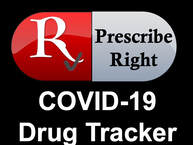|
COVID-19 Monoclonal Antibodies
Lilly announced interim data from 268 patients enrolled in the 800 patient, Phase II, BLAZE-1 trial (NCT04427501), where treatment with the combination of bamlanivimab and etesevimab reduced viral load at day 11. Use of bamlanivimab plus etesevimab resulted in 0.9% of patients requiring hospitalization or an ER visit compared to 5.2% in the placebo group. Lilly submitted a request for an emergency use authorization (EUA) for its monoclonal antibody bamlanivimab in October and plans to request an EUA for the combination of the two monoclonal antibodies, bamlanivimab and etesevimab, in November 2020. Regeneron submitted a request for an emergency use authorization for its monoclonal antibody combination, REGN-COV2. If granted, initial doses would be made available at no charge, because they are covered by a Warp Speed grant from BARDA. Hyperimmune Immunoglobulin NIAID is comparing a single dose of Anti-Coronavirus Immunoglobulin plus up to 10 days of remdesivir to remdesivir alone in the treatment of COVID-19 in the 28-day, 500 patient, Phase III ITAC trial (NCT04546581) in hospitalized patients with severe COVID-19. Baricitinib Lilly announced additional details from the Phase III, ACTT 2 trial (NCT04401579) where the largest benefit of adding baricitinib to remdesivir was seen in patients requiring supplemental oxygen or high-flow oxygen/non-invasive ventilation. Remdesivir The ACTT-1 investigators provided a final report on the NIAID sponsored study. In the 29-day, 1,062 patient, Phase III, Adaptive COVID-19 Treatment Trial (ACTT-1) (NCT04280705), patients treated with remdesivir for up to ten days had a median time of recovery (hospital discharge or returning to normal activity level) of 10 days compared to 15 days with placebo in patients with severe COVID-19. However, there was not a significant improvement for patients that required a ventilator or ECMO at study entry. At day 15, there was a significant difference in mortality with remdesivir compared to placebo (6.7% vs 11.9%), but the difference was no longer significant at 29 days (11.4% and 15.2%). Hydroxychloroquine The 15,000 patient RECOVERY trial (NCT04381936) has several arms testing lopinavir-ritonavir, dexamethasone, hydroxychloroquine, azithromycin, tocilizumab, convalescent plasma, immunoglobulin (IVIG) and the monoclonal antibody combination REGN-COV2. In the hydroxychloroquine arm of the RECOVERY trial, 1,561 patients that received hydroxychloroquine were compared to 3,155 that received usual care. There was no improvement in mortality at 28-days with hydroxychloroquine compared to usual care (27% vs 25%). Due to the lack of benefit seen at an interim analysis, the researchers discontinued enrollment in the hydroxychloroquine arm of the trial. Comments are closed.
|
Stay informed, subscribe to the Prescribe Right Pharmaceutical Pipeline Tracker
Archives
January 2023
Categories |
Services |
Company |
Support |
© COPYRIGHT 2015. ALL RIGHTS RESERVED.
|


 RSS Feed
RSS Feed